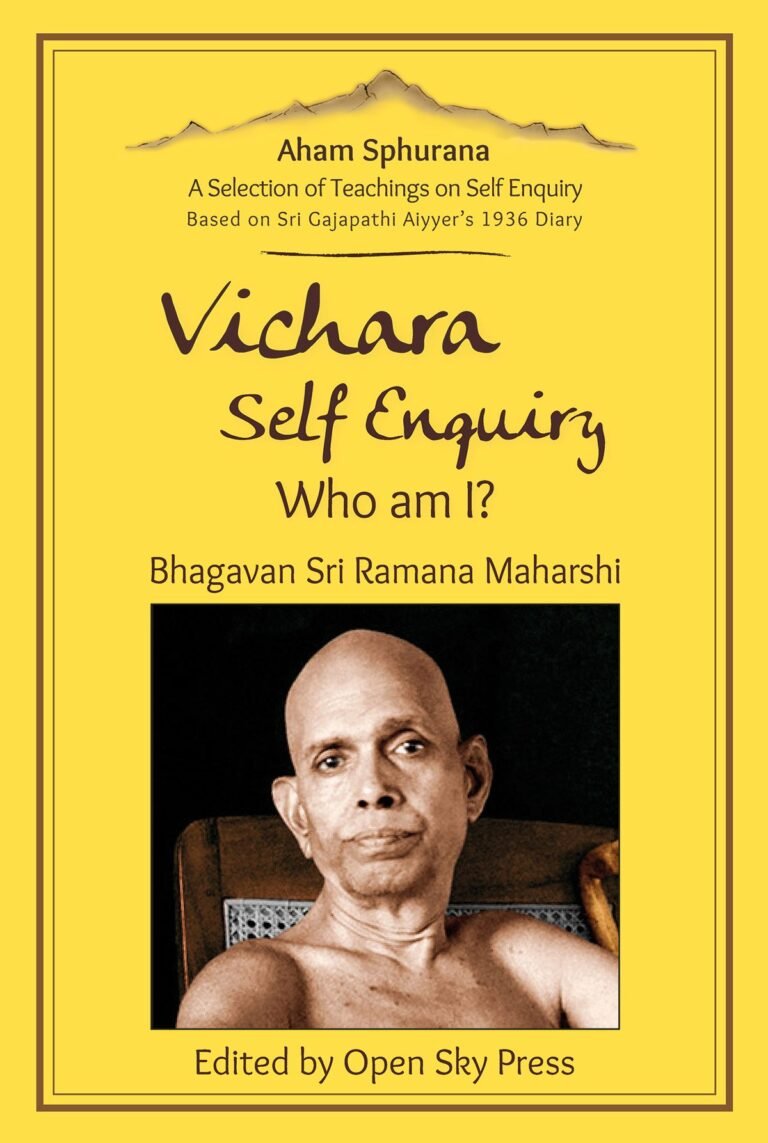Aham Sphurana
A Glimpse of Self Realisation
Bhagavan Sri Ramana Maharshi
A Selection of Teachings • Based on Sri Gajapathi Aiyyer’s 1936 Diary
The Aham Sphurana Series
“Early on October 1st 2021 waking up in a lakeside cottage at our Retreat Center in Ukraine I received an email information. On Amazon I could download an unknown manuscript of Bhagavan’s dialogues from 1936.
The excitement was penetrating deep inside as I struggled with Amazon and my credit card. The manuscript was some 1500 pages and with no formatting, extremely hard to read.
First lots strange drama but going into the middle there were wonderful dialogues between Bhagavan and his visitors. A selection was made, highlighted and put into editing software.”
John David, Director Open Sky Press, 2021:
THE FIRST VOLUME
Aham Sphurana
A Glimpse of Self Realisation
New Book about Sri Ramana Maharshi
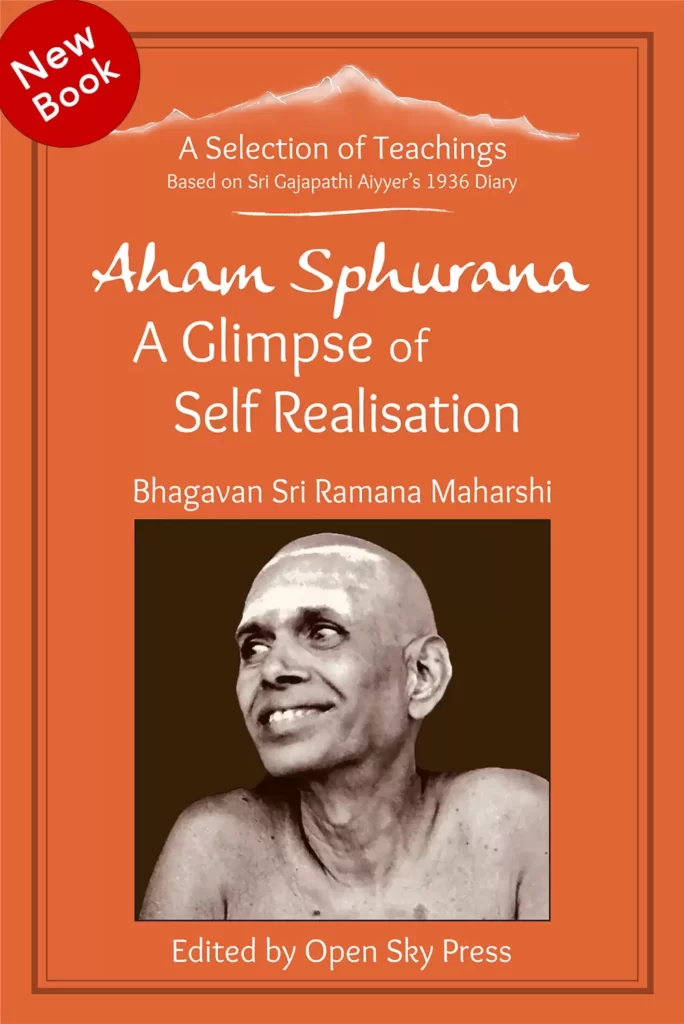
Available Worldwide
On www.openskypress.com and Amazon:

“In my opinion, Aham Sphurana, a Glimpse of Self Realisation, will become a Treasure Trove of Wisdom to the Seekers of Truth in general, and particularly to the devotees of Bhagavan.”
Swami Hamsananda – Athithi Ashram, Tiruvannamalai
Reviews
The Book has received wide attention and much positive feedback
⭐⭐⭐⭐⭐
Gangaji
10th July, 2025
A Profound Offering
“This collection is a profound offering for those who are inspired to deeper inquiry. I have read both for myself and others many passages that reveal freshly and intimately the gift that is Ramana Maharshi. This is a book to cherish.“
⭐⭐⭐⭐⭐
Christopher Titmuss
12th July, 2025
Suitable for anyone serious about the spiritual life
“An excellent book suitable for anyone serious about the spiritual life and committed to knowing profound and liberating realisations. The beauty of Ramana’s teachings shows in the unwavering directness with a remarkable clarity and simplicity. Meditate on the questions and responses. Listen inwardly beneath the mind’s activity.“
⭐⭐⭐⭐⭐
Solomon Katz
5th July, 2022
Unexpectedly finding a lost Shakespeare manuscript
“In telling people about this book, I’ve compared it to unexpectedly finding a lost Shakespeare manuscript! The notebooks from which this book is edited comprise a newly found treasure trove of Bhagavan’s teaching, and his voice comes alive. For any serious student of the Maharshi, this book is essential.”
⭐⭐⭐⭐⭐
NOACH ARC
5th July, 2022
Most Profound text on Ramana Maharshi
Aham Sphurana is the most profound, subtle and practical version of Ramana Maharishi. When you read this book you realize just how diluted, vague and lacking are most of the books published in the name of this great sage of Arunachala.
It is not an easy new age read, it is the real deal with all its subtleties and intricacies. Our role is to develop a profound, sensitive and subtle mind and heart to understand and absorb these teachings.
The persons who wrote and published this book faced fierce objection from many people and are no less than warriors of spiritual truth.
Their devotion and respect to Ramana Maharishi made them fight this war and they deserve our appreciation and respect for making these rare teachings available to us.
⭐⭐⭐⭐⭐
Rafael
21st June, 2022
Great, Great, Great.
Excellent job formatting and selecting from the huge manuscript.
Read through the first couple of chapters, almost like touching down in Ramana Ashram.
Must Read!! : )
⭐⭐⭐⭐⭐
Anu
Tiruvannamalai
4th May, 2023
The AS book is fantastic. There so many little stories / incidents unheard of before. I just open it randomly and read for inspiration. It feels very genuine. My librarian friend jj knew about it and praised the book. Thanks so much for giving it to me. It’s a treasure.
⭐⭐⭐⭐⭐
Modestus Lorence
23rd September, 2022
Simply the best book on Sri Raman’s Teaching
I have read only 10% of this book now. But I already felt overwhelming. The answers or explanations are crystal clear. Every seeker must read it!!
⭐⭐⭐⭐⭐
Isaac Shapiro
5th July, 2025
A Really Beautiful Book
“I savoured to read Aham Sphurana – A Glimpse of Self Realisation. Really a beautiful book.“
⭐⭐⭐⭐⭐
Sri Ramanacharana Tirtha Swami
(formerly Sri Nochur Venkataraman),
January, 2024
Profound and helpful to the seekers
“Thanks for presenting the book. I went through the book and it is indeed a good read. As you have mentioned, certain portions are controversial. However, many portions on Self-enquiry (genuinely in Bhagavan’s words) are profound and helpful to the seekers. Pranams”
⭐⭐⭐⭐⭐
Paul
5th August, 2022
One of the best texts by Sri Ramana Maharshi
This book is an edited version of “Aham Sphurana” which only takes the relevant text from Aham Sphurana and leaves out the portion of no interest. What remains is a great text in the style of “The Talks” but immensely better than the more popular Talks.
Reading the comments by Sri Ramana from this book I get the impression that the Talks must have been edited heavily since this book gives more elaborate details of various topics of Sri Ramana’s teachings like Self-Inquiry, surrender and much more. The Talks seems to leave out certain details since there is also content in the Talks from July 1936 which is different than this account.
The author, a lawyer visiting the ashram from July-December 1936, gives an incredible record not only of the teachings but also of Sri Ramana’s reactions to day-to-day life including never before published tales from Major Chadwick and S. Cohen which were present at the ashram at the same time.
This book, or the original Aham Sphurana, is a must for any sincere devotee of Bhagavan!
⭐⭐⭐⭐⭐
A.G.
14th September, 2022
The book Aham Sphurana is gem of a book, an offering par excellence for all seekers. I am currently reading the book. The editing done by your team is great effort for making this knowledge available for all seekers in a simplified manner. The printing and paper quality is excellent, done with love and care.
Sincerely hoping for the rest of the volumes to be published. By when will all the remaining matter be published ? Please let me know.
Thanks and Regards.
⭐⭐⭐⭐⭐
Amba
12th October, 2022
Profound, touching masterpiece
An absolute masterpiece about the profound teachings of Ramana Maharshi combined with authentic and touching stories from life in the ashram. By reading this book you can directly feel how the pure truth in his teachings is able to penetrate deeper within us – sometimes it seems like he is present while reading. In every little detail you can feel the love that went into compiling the old manuscripts into this extraordinary work. Deeply touched by all the wisdom that lies in this treasure chest, I just want to say thank you – thank you for this enrichment!
⭐⭐⭐⭐⭐
Swami Nirvritananda Puri
Tiruvannamalai
2nd May, 2023
I have read the first volume of Aham Sphurana — A Glimpse of Self Realisation culled from the original manuscript of the same. It’s very difficult to put into words how I felt on reading that book. All I can say is it’s mind-blowing. I hope you will soon bring out the rest of the portions too from the original manuscript of Aham Sphurana.
THE SECOND VOLUME
NEW: Vichara – Self Enquiry, Who am I?
[Aham Sphurana Series, Vol. 2]
Vichara offers a fresh and focused exploration of Bhagavan Sri Ramana Maharshi’s most profound teaching: Self-enquiry.
It also provides an intimate glimpse into life at the Ramana Ashram in 1936, a period when Bhagavan’s teachings also began reaching Western seekers.
Following the success of the first volume, Aham Sphurana – A Glimpse of Self-Realisation, this second volume delves deeper into the practice of Self-enquiry, which Bhagavan described as the fastest and most direct path to Self-realisation. Bhagavan’s luminous presence shines through this profound book, offering transformative wisdom for those on the path to spiritual awakening.
Discussion about the Book
John David in dialogue with Om C. Parkin
Commentaries
At the 2023 Arunachala Pilgrimage Retreat John David commented on the Teachings of Sri Ramana Maharshi in the Aham Sphurana Book
"You may imagine to yourself that you have parted from God, but know that He never parts from you."
DEC 1948
Sri Gajapathi Aiyyer, Author of Aham Sphurana, visiting Bhagavan with his Diaries.
Sri Gajapathi Aiyyer was a distinguished lawyer and a devotee par excellence of the Maharshi. He came to Ramana Ashram in 1936. He stayed for perhaps six months and kept meticulous diaries of the meetings in Bhagavan’s Hall.
These diaries are the core of the manuscript known as Aham Sphurana [‘I’-Pulsation]. It seems that in the 1950s his friend, Swami Rajeshwarananda, wanted to publish these notebooks. At that time the ashram didn’t have the necessary resources.
Now some seventy years later a manuscript has appeared, Aham Sphurana, which appears to contain the material from Sri Gajapathi Aiyyer’s Red Notebooks. It may well be that other material has been added. It is a huge text of more than 1000 pages.
In December 1948 Sri Gajapathi Aiyyer and his friend Swami Rajeshwarananda took a trunk containing half a dozen notebooks to Ramana Ashram and it was unpacked in front of Bhagavan.
Gajapathi Aiyyer ran through the books patiently. They are hardbound notebooks, all of the same variety, done in beautiful red rexine. The pages are serially numbered from one to three-hundred, in black ink. The pages opening on to the left-hand side have their number inscribed at the top left corner and those on the right-hand side at the top right corner. The pages are lined with bluish lines in narrow spacing, and filled with young Gajapathi’s meticulous note-making competencies, all written in pencil.
(See back of book p. 231 for four of these original pages – Ed)
Bhagavan smiled and said: See, how nicely the child has written everything!
Swami Rajeshwarananda: Gajapathi feels that he has committed an offence by chronicling your words without having sought out your permission.
B: Does not matter.
Gajapathi: I only wrote for my own recollection; if shown to others, will it not lead to confusion? Bhagavan gives specific advice to individual persons on spiritual matters; if shown to an unrelated person will that person not erroneously think that the advice is also applicable to his own case, and so mislead himself, with unwarranted consequences? Yet Swami Rajeshwarananda wants to make it available for all in the ashram to inspect.
Swami Rajeshwarananda: Bhagavan’s words are more solemn and sacred than the Upanishads [sacred Hindu scriptures] even. Why opine they could mislead anyone?
B: Somebody may have the same doubts as that of the entries in these books.
Gajapathi: But Bhagavan gives different responses to the same question to different persons, depending upon individual temperament!
B: If the reply found is not satisfactory, the search continues! The earnest seeker does not make himself content with the receipt of a response felt by him to be unsuitable, or only partially satisfactory. An intellect made subtler and subtler by repeated and prolonged submergence in Being, will automatically reject advice that directs it away from the Heart.
Practising firm Permanence in the Shining of the Heart strengthens the faculty of intuition to the extent that it seeks out, time and again, only those words that redirect its course toward the self-resplendent Heart; such discrimination is not a function of the fictitious sense of individual free will; rather, it is automatic and comes by God‘s Grace to the sincere seeker.
Gajapathi was about to say something, but it was time for the veda parayanam [Vedic chanting in Ramana ashram] to begin.
Bhagavan, reaching for his stick, remarked before leaving:
There is a destiny guiding the course of events. One need not fret about anything, imagining oneself to be personally responsible for it.
Bhagavan's Teachings
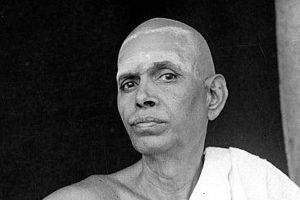
Essential Extracts from the Manuscript
Q: So, is this state of consciousness steadily remaining merely as Itself, undisturbed by thought, called the Sahajastithi?
B: No. It is called Aham Sphurana.
Q: Then what is the Sahajastithi?
B: No description is possible. The reflected being — consciousness which is localised in a physical body — is destroyed; after this is destroyed, that alone remains which has always been.
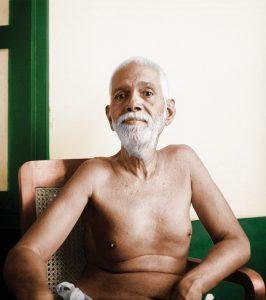
A Dialogue with a Mature Visiter
Mind is only a notion. Have you ever investigated into what it actually is?
GL.: No… I seem to have taken its existence for granted so long.
B.: That is the mistake. The mind is accepted as being the Self. The Self is always – whereas the mind appears and disappears. Is there any mind in deep slumber? But your Self is always there. The mind, which has deluded itself into imagining that it is a mortal with a physical form living in an objectively real world as its perceiver, is beset with limitations.
On the other hand, pure Subjective Consciousness knows no limitation.

Schopenhauer and Renunciation
Q.: I have heard that Bhagawan once spoke highly of Schopenhauer.
B.: He has discovered that the world is an inherently and incorrigibly unhappy place; he has also discovered that man’s true purpose is happiness; furthermore, he states correctly that extirpation of one’s personal will leads to Emancipation. However, what seems to be missing is practical technique. How shall the wille-zum-leben, which is the cause for all suffering, be defeated and annihilated?

How shall we kill the mind?
B.: Is it the mind that wants to kill the mind? The mind cannot kill the mind. Anything that you endeavour to ‘do’ with the mind will only reinforce and perpetuate the notion of mind. Rather than pointlessly wondering, ‘How shall I eradicate the mind?’, go on seeking the mind. Incessant search for what mind is results in its disappearance.
The thing to do is to completely ignore the objects that appear by the reflected light of the mind, and instead seek the source of the mind’s illumination. If the source of the mind is continuously sought for, it begins to subside.

Obstacles which Hinder Realisation of the Self.
Q: What are the obstacles which hinder Realisation of the Self?
B.: They are habits of mind (vasanas).
Q: What are the aids for Realisation?
B.: Introversion of mind is the one and only aid.
Q.: How can I achieve the same?
B.: By preventing the mind from straying out after thoughts, desires and imagined objects of sensory perception.
Q.: What are vasanas?
B.: Habits of thought, accumulated tendencies of mind, and intellectual proclivities.
Q.: How does one get rid of these hindrances?
B.: Seek the Self through meditation in this manner: trace every thought back to its point of origin

A Typical Western Visitor’s In-Depth Dialogue with Bhagavan
Time and again I have observed that the Maharshi emphasises that Realisation was more the result of Guru’s Grace rather than anything else. I had been in despair of ever again getting the Maharshi alone. It is hard to unburden the soul before a crowd.
One morning I resolutely made my way into the Hall a few hours earlier than usual and found him there unattended, emanating his usual wonderful stillness and ineffable peace. I asked quietly if I might talk with him. He nodded, smiling, and sent for someone to translate. On the arrival of a devotee, I put my first question.

The Heart
Q.: Will chanting “A-HAM” [Self] mentally lead to realisation of the Self?
B.: Whilst doing it, fix your attention at the source of the japam[ ] in you. That is, scrutinize where from within yourself the japam arises and retain your faculty of attention exclusively at such source.
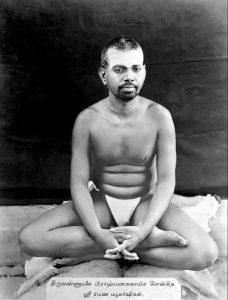
Non-Doing
Q.: If I stay at the root of the mind or abide as pure consciousness, will I Realise the Self?
B.: The question shows that the arbitrary mental conceptualisation, ‘Realising the Self’, is still present in the mind. Staying in the root of the mind should be a matter of course; it must be the natural state. On the other hand, you are trying to deliberately do it so that you can thereby gain the reward you call ‘Self-Realisation’. Can it work? No.

Mind and Jesus Teachings
Q.: I have heard Bhagawan saying “Knowledge of the world is exclusively knowledge of the knower of the world.” What does it mean?
B.: That the world is only in the mind–that the appearance of any world, or the phenomenon of manifestation, is not possible in isolation from your mind.
Q.: Are there as many minds in the world as there are people? Are all these minds emanating from the Self at the same time?
B.: There are not multiple minds. Only your mind emerges from the Self, styles itself “I”.

Surrender
Q.: Is surrender a means to overcome and vanquish the vasanas [tendancies of the mind], thus resulting in Realisation?
B.: Yes: provided it is unconditional, surrender is a fool proof way to Realise the Self.
Q.: What is the guarantee that I shall Realise the Self if I surrender?
B.: You are missing the point of surrender.
Q.: How so?
B.: To surrender is to let go of everything without anticipating or expecting anything in return.

Renunciation
Q.: How does viveka [discernment] differ from
vairagya [renunciation]?
B.: Mere intellectual discernment of the real from the unreal is not of any great use. The unreal must be totally shunned, that is to say, the mind must be divested of any inclination to pursue it. One’s vasanas [ tendencies of mind] must be incinerated to the point of complete annihilation in the fire of vairagya; otherwise rebirth cannot be successfully avoided. Viveka may stop with intellectualisation and mental contemplation of the truth. But without vairagya Jnana cannot be achieved

Only the Self, No God
Q.: What is the difference between jivanmukti[ and videhamukti?
B.: There is no difference. They say that the jivanmukta attains videhamukti when the body dies. But think can there be anything which he has yet to attain? Such differences are exclusively from the point of view of the onlooker. They do not exist from the Jnani’s point of view. There is no change in the Jnani’s state before or after abandoning the body.
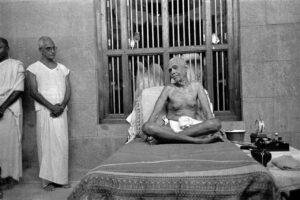
Illusion and the Body
Q.: Bhagavan asserts that ‘Awareness’ is the real nature of “I”. But what exactly is this awareness? Awareness of what?
B.: Do you exist or do you not?
Q.: Yes.
B.: How do you know?
Q.: I don’t understand what Bhagavan is trying to tell me.
B.: Do you need a mirror to be placed in front of your eyes in order so as to enable you to infer that you have eyes?

The Count
A sallow-faced gentleman, a foreigner, wearing a pencil moustache approaches Bhagavan after everyone has left the hall. I am instantly reminded of Count Orlok in Nosferatu, played so memorably by Max Schreck. He creeps near the Sofa, his long hands slightly outstreched in Bhagavan’s direction. I am glad he does not notice me, hidden away as I am in the Shadows at the back of the Hall. The attendants are asleep a yard or so away from me, and these prone bodies have also evidently escaped his attention. I want to cry out a warning to Bhagavan, but I am worried for my own safety. I wait with bated breath for the anticipated lines to be spoken.

Unrealise the not-Self
Q.: If the theological pronouncements of the Christians are to be believed, we are all born mired in sin. Is the doctrine of original sin correct?
B.: What is born is born only in sin. The Unborn is sinless; therefore He is never born. Birth into samsara is the harbringer of agony. In fact you are the one original Absolute.

Jaws of the Tiger
Q.: Has anyone succeeded in winning the admiration of Maharshi himself?
B.: Oh! yes.
Q.: Who?
B.: You.
Q.: [face superciliously lights up with pompous joy, but manages to modestly utter] How can that be? I am a spectacularly worthless creature. Even after years of repeatedly visiting the sacred soil of Tiruvannamalai, I remain an unenlightened person.
B.: That is it.

Samadhi
Chad.: I asked my master if He would mind giving me a detailed explanation concerning the term Samadhi, and its various kinds. The Lord Ramana graciously assented and sweetly spoke the following words:—
B.: The meaning of the word Samadhi is generally given as Union with Reality, but it is not so. Samadhi means the State of non-differentiation from Reality or THAT-WHICH-IS. The following are its kinds:
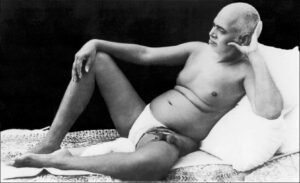
Realise the Self.
Q.: What is the guarantee that I shall Realise the Self if I surrender?
B.: You are missing the point of surrender.
Q.: How so?
B.: To surrender is to let go of everything without anticipating or expecting anything in return. Letting go of everything also encompasses abandoning the aspiration to Realise the Self. Suppose you are holding a red-hot iron-ball. Your hand is quivering in unbearable pain. Somebody suggests unto you that you let go.
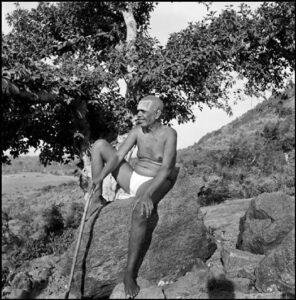
Destiny
Q. Is it true that Bhagavan has said, “If a man is destined not to Realise the Self, no matter what manner of aid or assistance is offered unto him or stands available so as to be plunged into ready deployment by him, he will not Realise the Self. On the other hand, if a man is destined to Realise the Self, no matter what manner of hindrance or trammel is placed across his path or is forced to be encountered by him, he will Realise the Self.”?
B.: The statement is correct.
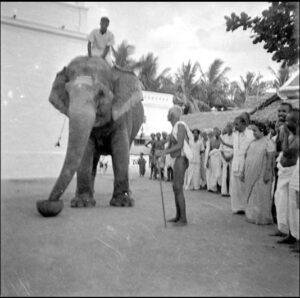
I have a body
Q.: So, it is the thought ‘I have a body.’ that is responsible for creating the false impression that I have a body, whereas in truth I have none. Am I correct? _
B.: Yes. _
Q.: In that case, if I think, ‘I have no body.’, the body should disappear, but it does not disappear. Why is this so?
B.: Intensely thinking about the disappearance of the body does make it disappear; but accquisition of such worthless siddhis [Psychic Powers] is not our objective.
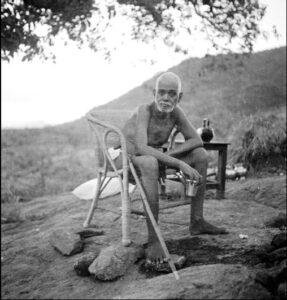
Consciousness
Q.: After investigating ‘Who am I?’ I find that blankness prevails. What do I
do?
B.: Did you exist or not whilst the blankness mentioned by you prevailed?
It is only because you existed then that you now are able to recollect having experienced something at that time. Is that correct?
Q.: Yes.
B.: So, blanknesses come and go, but YOU always ARE. For YOU there is
neither coming nor going. YOU ARE now as YOU always WERE and YOU
will BE always as YOU ARE now.

What is the Purpose of Life?
Q.: What is the purpose of life?
B.: It is to discover the correct answer to this question.
Q.: What is the correct answer?
B.: Life.
Q.:I do not understand?
B.: Life does not question its own purpose. It has no questions to ask. It has no complaint to raise. It has no grudge to bear. Therefore it is in perpetual peace.
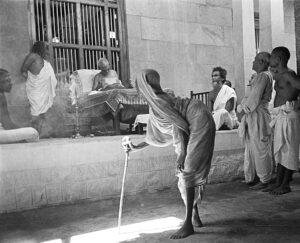
Guru’s Grace
Q.: The terms Aham-sphurana [Self-realization] and Sahaja-asamprajnatha-samadhi [oneness with God] are synonymous. Am I correct? _
B.: No.
Q.:Why not?
B.: Sometime after a fire is lit underneath a pot containing water, only an empty pot will be left. Yet, the space inside the pot is always vulnerable to being filled-up again. If the pot is smashed into pieces, it is quite ruined and there can be no scope any more for depositing anything into it.
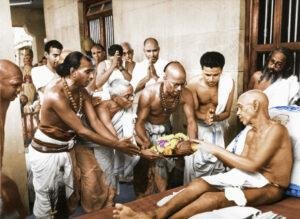
The Answer is to Enquire,”Who Am I”
A curious, altogether ridiculous personality has arrived at the ashram gaudily dressed in a three-piece suit, a beaver hat, and an ascot cravat. In this weather, his skin ought to catch fire; I wonder how it still seems to be intact. He carries an ebony cane mounted with a miniature bronze, roaring lion’s head.
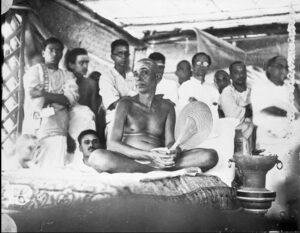
Vichara, Self Enquiry
Q.: What are the indicators based on which I shall be enabled to find out for myself whether I am doing vichara [Self enquiry] correctly or not?
B.: If vichara has resulted in a state of mind wherein it abides as identical with pure Subjective Consciousness, then you have done it correctly.
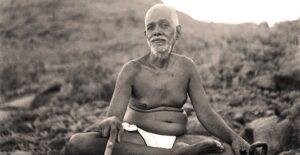
Meditation
Q.: I am unable to Realise the Self by means of meditation.
B.: Where are you now? Are you in the Self or out of it? Can there be anything apart from the Self?
Q.: I understand that the Self is non-dual. Yet ignorance prevents me from realising the non-dual Self.
B.: Who is ignorant of what? Are there then two selves, so that one of them can be ignorant of the other?
Glimpses of Bhagavan's Life
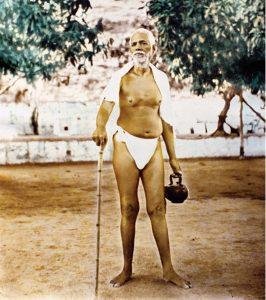
A Former Classmate Visiting Bhagavan
B.: Why all these fancy items? You yourself have family-members who are suffering from asthma: is that not so? Is this body more important than or in any way superior to those bodies? How is it that ignoring them you have brought this medicine over to me? If you give this to those who truly need it, they will feel happy. I have no use for such things. I cannot think “Oh! we are taking medicine for our good health.” and feel elated. [smiling, in demure fashion saying—] I hope you are not angry with me…!
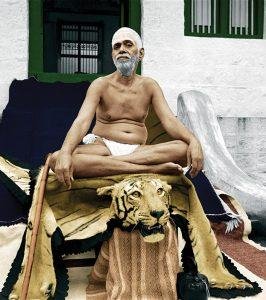
Mrs Piggot’s Diary
I was told that the Maharshi had his finger on the pulse of the whole ashram, although he appeared prima facie totally unconcerned with all mundane affairs. For instance, when in the Hall, he was supposed to know what was going on even in the kitchen — and incidentally I was surprised to find that he himself assisted in the cutting up of vegetables for the daily meal.
I was also told that he knows what is passing in the minds of people. Of this latter ability, I had a small personal experience.

A Small Wise Boy
B.: Did you notice what your son said? What was his request? He would stop playing with his pambaram [Spinning top], but the present session of rotation must come to a close naturally. You, of course, paid no attention to his imploration, but stopped the pambaram then and there.
However, Ishwara is not like this. The prarabdha which is attached to the Jnani’s body will have to exhaust itself inevitably.
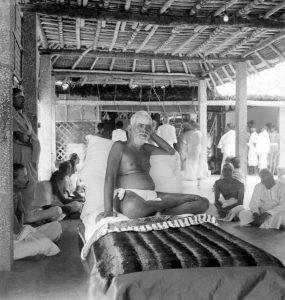
The Juggler
A certain man who, I learn, puts on juggling performances every year during the Karthigai Deepam festival, has come to the Hall; he has questions to ask of the master—
Q.: Does Sri Maharshi possess the power to turn his body invisible at will? Does Sri Maharshi possess the power to materialise objects out of nothing or thin-air?
B.: Sri Maharshi does not even possess a will.
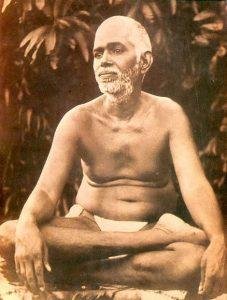
Sri Gajapathi Aiyyer Ashram Report
For the most part of today I was unable to go to the Ashram. Since Sri Cycle-Pillai seemed to be indisposed for the time-being with one of his occasional abdominal ailments, and was thus not in a position to do his usual chores for the Ashram. The sarvadhikari [manager] has asked me to purchase roots of the shathavari [Asparagus racemosus] plant from a herbs-dealer who put up his wares in different parts of the town on different days.
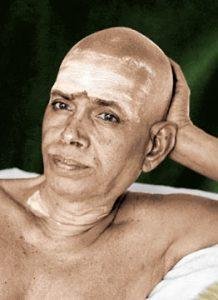
Trust in God
A scene took place in the Hall, wherein the master upbraided the sarvadhikari [manager] in front of all the attendees. Seeing the dilapidated condition of the Draupadiamman-temple near the Ashram, Mr. Knowles had donated a sum of 75 rupees toward its upkeep and maintenance, with a view to prevent at least further incremental damage to the somewhat neglected ancient shrine on account of efflux of time; he had donated the sum to Sri Sadai Chettiar, the temple’s manager. The sarvadhikari had come to know about this, and had wrested away the sum in part from the poor man, telling him,
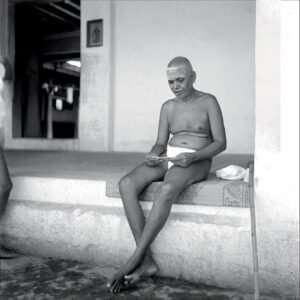
Reference Books and Translation
Much of the content presented here, showing Bhagavan reeling off verses from the Bible and other texts, are done so with the implicit assumption that the reader would naturally give himself to understand that Bhagavan was reading out from a book; certainly Bhagavan did not burst out with these lines of prose or, as the case may be, poetry, from extempore memory – at least, not in a majority of the cases.
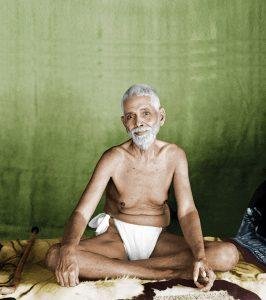
Love Is
Oh! Master of the Formidable Mountain! I was earlier like a filthy pig, consuming with eager relish the turds excreted by the sensory – organs. I came with a restless mind to impudently scrutinise your authenticity, but the moment your eyes fell on me, I became motionless like you, for you graciously annihilated my maleficent faculty of assertion – manufacture which arrogantly asseverated “I”, and immersed me in my own intrinsic inner state of Absolute Being, which in truth is only You.
I kiss the dust of your sacred feet everyday, for by drowning me once and for all in the unfathomable ocean of exultation which is verily You, you have devoured my traitorous mind forever.
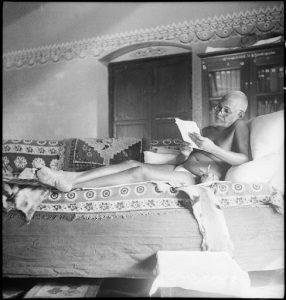
Letters to Bhagavan
During the Master’s lifetime, the practise existed in the Ashram for devotees to send in letters asking for all manners and varieties of things. Most begged for Bhagavan’s blessings in their endeavours, and specifically would mention that the sheet carrying the reply be sanctified by his hallowed touch.
Many wrote wanting their prayers or wishes to be fulfilled. Others solicited clarification on doctrinal points. Yet other epistles carried doubts raised regarding practice.

40th Anniversary Event
Late in the evening today, the sarvadhikari [manager] requested the master to formally oversee and approve of the preparations the Ashram has made, for the celebrations arranged for tomorrow. Tomorrow is the 40th anniversary of the day on which the master is said to have attained Eternal Union with Arunachala: 1st September, 1896.
Many devotees, Indians as well as Caucasians, have gathered together here now, and the place is overflowing with people.
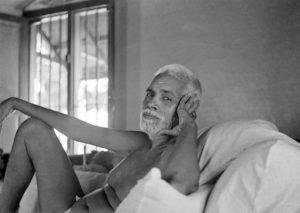
Vishwanatha Aiyyer and the Monkey
Q.: How did Bhagavan finally persuade that boy, Vishwanatha Aiyyer, to return home?
B.: I did not. On that night when he was sleeping outside the ashram, I was sitting some distance away from the boy when I noticed that Shabarigirisan was sitting blissfully alone on the roof of the ashram, staring at the full moon in great contentment. When I looked at him, the languor [monkey] leaped down, pressed some ginger shoots into my hands and took them back; then he climbed back and was for sometime ingesting them. Then he did something nobody will believe. He came near us, poised himself on the floor in the Bakāsanam, and softly began whistling [or screeching], perfectly, the tune corresponding to ‘Endaro Mahanubhavulu…’.
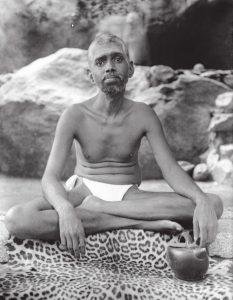
Sri Gajapathi Healed and Attacked
The master laughs like a child and says softly,
“The redeeming power of Love alone makes one worthy of Grace. If you have a heart that knows to truly Love, be assured that you have the instrument in your hands with which to win over Emancipation. Love alone is the கடப்பாைர with which to prise open the terrifically strong knot of the Heart.”
The words make the hairs all over my body stand on end; a thrill of sheer, ecstatic joy runs up my spine, and I shudder involuntarily.
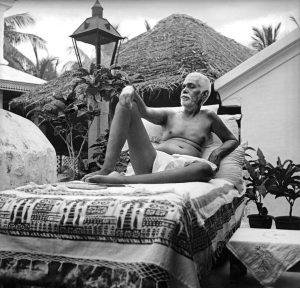
A Dog and A Monkey
Q.: Can then an animal Realise the Self?
B.: It is not unheard of.
B. now looked at Chadwick, who was present in the Hall, squarely in the eye, and said:
When you came here first, you asked [me] how the Guru’s help is useful in bringing about Realisation. You were told that it makes the poisonous fangs of samsara ineffective. Now do you see?
Chad. merely looked uncomprehendingly vacant.
B.: Whilst the monkey was seated on this [pointing to his body], it was quite beyond the reach of the dog.
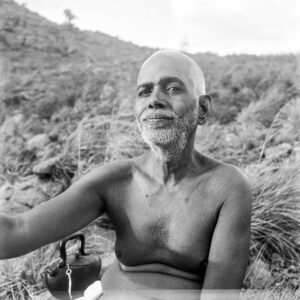
Mrs. Piggot Introduces the Ashram And Bhagavan’s Meetings in 1934
I had visited India on several occasions prior to this trip, but this was
my maiden venture off the beaten track.
I was told of Sri Ramana Maharshi, and even from the little I heard, I knew I would travel anywhere and put up with any inconvenience in order to meet him and experience the sanctity of his presence. The friend who gave me the welcome news of the Maharshi’s existence offered to take me to him, and so we arrived at Tiruvannamalai late one afternoon.
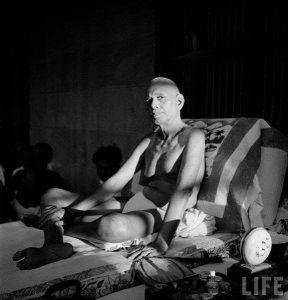
The Aghori Sadhu Life Story
A strange, decrepit old sadhu, who claims he is a centenarian, has arrived at the ashram. When asked for his name he gives the response, ‘Purampoekku chamiyar’. He claims to have first met Sai Baba in 1898; ever since leaving the saint, according to him, he has never lowered his right hand; it remains pointing up towards the sky, index finger unfolded and outstreched straight but the other fingers folded in. The arm seems covererd with greyish-white dust or fungus and the
long fingernails have become an intertwined mass reaching down to the elbow.

Mr. Evans-Wentz’s Visit
Q.: Sometimes I feel thought stopping and the feeling of beingness underneath is exposed and revealed. At the same time a pulsating sensation is felt on the right-hand side of the chest. Is it right?
B.: Yes. Thoughts must cease and reason disappear for ‘I-I’ to rise up and be felt. Feeling is the prime factor and not reason.
Q.: Why should it be felt in the chest but not in the head?
M.: Because body-consciousness is located there.
Q.: When I see outside the sensation disappears. What is to be done?
M.: It must be held on to incessantly.

The Play Around Bhagavan
B.: The genuine state of Self is the non-dual Sahaja-stithi [ ]. This cannot be experienced because in that state there is no experiencer. Whatever is experienced is only unreal and illusory. The fact that an experiencer is available to assert ‘I experience.’ shows that all experiences are futile and worthless. ‘Who is the experiencer?’ is what we must find out. Some think experiencing bliss means that the Self is Realised. Nothing could be farther from the truth. Bliss is a dangerous distraction.
Libelling Bhagavan
7th August, 1936
Early in the morning as usual the sarvadhikari [manager] arrives with wet dhoti [cotton wrap] and prostrates in front of Bhagavan whose eyes are closed. The meditating Aghori and myself are the only others in the Hall. Observing the master in a meditative inflection of comportment, I have, as always on such instances, closed my eyes. The sarvadhikari rises; he lingers for a fraction-of-a-second longer than usual. Then he moves toward the door.
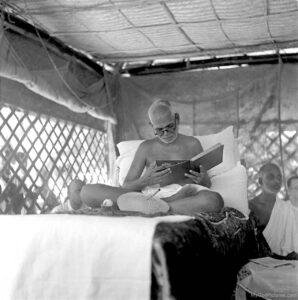
Sri Gajapathi Aiyyer, Author of Aham Spraruna
Sri Gajapathi Aiyyer was a distinguished lawyer and a devotee par excellence of the Maharshi. He came to Ramanasramam in the 1930s. He stayed for perhaps six months and kept meticulous diaries of the meetings in Bhagavan’s hall.
He is the author of the core of the manuscript known as Aham Sphurana. It seems in 1950’s his friend Swami Rajeshwarananda wanted to publish these notebooks. At that time the ashram didn’t have the necessary resources. Now some 70 years later a manuscript has appeared, Aham Sphurana, which appears to contain the material from Gajapathi Aiyyer’s Red Notebooks.
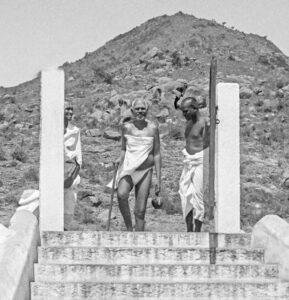
The Aghori’s Death and Liberation
‘When coming into the presence of the Jnani, some sensitive minds might alacritously plunge into instantaneous introversion. Then, their vasanas would- suddenly- put up a great clamour for attention. Caught between the desire to remain in the newly-discovered blissful thought- free state and the urge to satisfy demands imposed by the vasanas, such persons might, for a time, exhibit abnormal behaviour. But soon God’s Grace would set everything aright, provided there is a sincere determination to escape from samsara…’

Kaushika
Once upon a time there was an ascetic known as Kaushika. He always felt greatly proud of himself, since he felt he knew the intricacies of Vedanta in and out. He had left home to pursue study of the Scriptures and now he could confidently boast that he had mastered them all. One day, Kaushika was sitting under a tree, plunged in samadhi. Suddenly he found his concentration disturbed by a loud noise and he awoke from his samadhi.
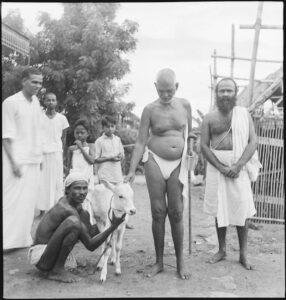
An Incident between Bhagavan and Chinnaswami [Brother], the Ashram Manager[sarvadhikari].
I flinched, for when Bhagavan is angry- an extremely rare occurrence- waves of ire are felt by his devotees to be radiating everywhere in the ether. The sarvadhikari, however, seemed to be too pre-occupied with the contents of his head to pay any attention to what he must have surmised to be a coversation going on between Bhagavan and a devotee. He rose from his prostration and went to the door.
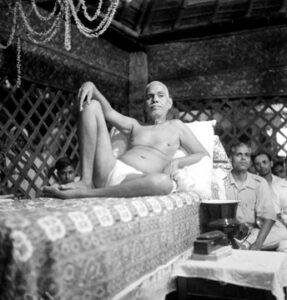
Gossip
Chad.: How had she come to know about Bhagawan? Paul Brunton’s Secret India was not published then.
B.: She had read about me in the International Psychic Gazette, but that article had not motivated her visit. Reading that article, she had become briefly fascinated with the ‘Hindoo-saint’ described therein; later on she forgot all about him. One day, she seems to have heard a knock on the door of her apartment, situated near Stonewall Inn in Manhattan. On opening it, who should be standing there but Sri Ramana Maharshi himself! [laughing]
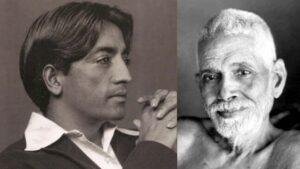
J.Krishnamurti’s, Dissolution of the Order of the Star
Q.: I cannot so easily let go of everything as suggested by Bhagavan, because my family will raise objections if I try to renounce the world.
B.: There is no need to leave home. Discard the contents of the mind and thus throw the faculty of mind away. That is real renunciation. Physical renunciation will make you think, ‘I have renounced everything.’ Nothing could be more dangerous. Here we practise only mental renunciation.

